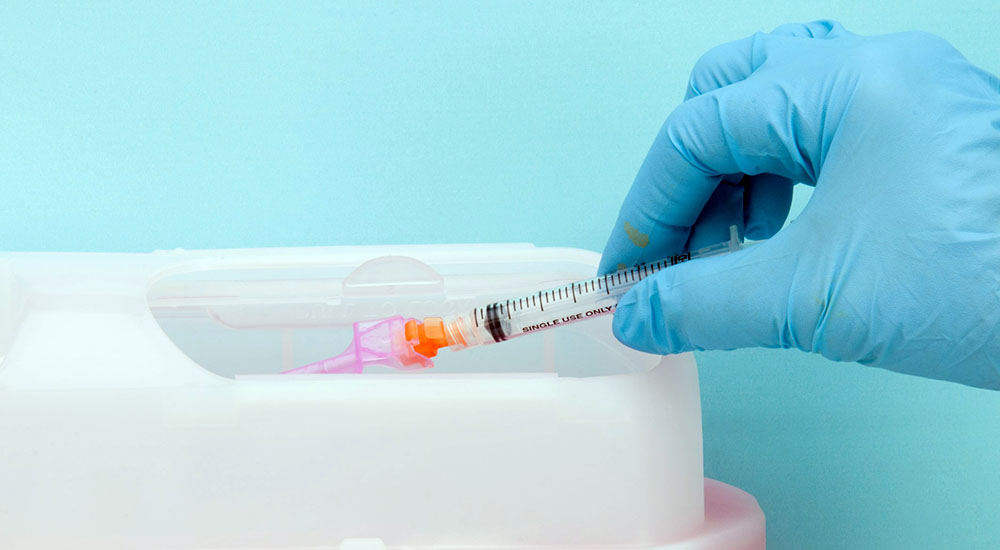Susan Ousterman lost her son Tyler to an overdose when he was 24. If the state of Pennsylvania had legal, widespread syringe access, she believes, he would still be here. It’s why she’s fighting for syringe access now.
“I wasn’t aware of so many things while I was going through this with him,” Ousterman told Filter. “I didn’t know of services that were available … Two weeks after his funeral I made a list of all the barriers and decided to dedicate my life to trying to fix them.”
On October 27, Senate Bill 926 was formally introduced in the Pennsylvania legislature to authorize syringe service programs (SSP). That day, a statewide coalition of advocates gathered for a rally at the State Capitol building. Led in part by the Pennsylvania Harm Reduction Network, the coalition is calling on the legislature and governor to pass the bill.
Pennsylvania has the third-highest overdose death rate in the United States. SSP reduce blood-borne disease transmission and help drug users stay safe—and stay alive, by providing not just sterile equipment, but a range of overdose prevention supports including naloxone. Yet they are constantly under siege from politicians and all manner of harm reduction opponents on both sides of the political aisle.
Tyler wanted to enter substance use treatment, but was denied because he was uninsured.
When Tyler was arrested for syringe possession, he was placed on probation. When he missed a probation appointment, he was jailed for two weeks. During those two weeks, his Medicaid coverage lapsed.
After he was released, Tyler began injecting again. He wanted to enter substance use treatment, but was denied because he was uninsured.
He applied for county health care funding, but was told he was ineligible because he had a medical marijuana card (Ousterman later discovered this was a lie).
Two weeks after that, Tyler fatally overdosed.
The Fight for Syringe Programs in Pennsylvania
Pennsylvania, a state with nearly 13 million residents, currently has just two authorized SSP: Prevention Point sites in Philadelphia and Pittsburg, which were authorized under executive order by the mayor and board of health. Some additional syringe distribution is conducted through county health departments. Syringes remain criminalized as drug paraphernalia under state law.
“We have a ton of unsanctioned syringe service programs,” Pennsylvania Harm Reduction Network Cofounder Brooke Feldman, who helped organize the October 27 rally, told Filter. “It could be a person who’s just slinging syringes out of the trunk of their car on their own time and dime, just to make sure that the folks who are using drugs in their community are doing so as safely as possible.”
Feldman emphasized that Pennsylvania is in dire need of authorized services, especially under the current syndemic of COVID and historically high overdose.
“We also see HIV and hepatitis C transmissions increasing among people who inject drugs, and that happens with tremendous racial disparities,” she continued. “If you’re Black or Brown [and] injecting drugs, you’re at a far greater risk.”
“There’s a real lack of education for parents.”
There are 150 different Pennsylvania organizations that publicly endorse authorizing SSP. The introduction of SB926 was a culmination of a years-long effort to build local support for the programs, but authorization wouldn’t mean an end to barriers. Any new SSP will still need support from local elected officials and community members. There’s no guarantee that support will come.
Ousterman doesn’t shy away from telling Tyler’s story. She wants to use her experience to change minds—and laws.
When she has a break from engaging politicians or rallying at the State Capitol, she joins in support groups for parents whose children use drugs chaotically.
“There’s a real lack of education for parents who have kids in active addiction,” she told Filter. “[We’re] also trying to educate them on the harms of ‘tough love,’ because that’s still really prevalent.”
“Once I finally started to listen to [Tyler] and give him respect as a human, is when things were better for us,” she said. “Unfortunately it just was a little late.”
Photograph via Department of Veterans Affairs





Show Comments